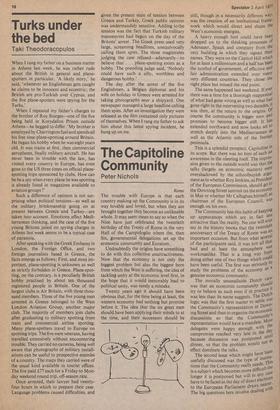Turks under the bed
Taki Theodoracopulos
When I rang my father on a business matter in Athens last week, he was rather rude about the British in general and planespotters in particular. 'A likely story,' he said, 'whenever an Englishman gets caught he claims to be innocent and eccentric; the British are pro-Turkish over Cyprus, and the five plane-spotters were spying for the Turks.'
When I repeated my father's charges to the brother of Roy Sturges—one of the five being held in Korydallos Prison outside Athens—he begged to differ. 'My brother is employed by Charrington fuel and spends all his free time plane-spotting around Britain. He began his hobby when he was eight years old. It was trains at first, then commercial aeroplanes, finally military aircraft. He has never been in trouble with the law, has visited every country in Europe, has even gone to the US three times on official planespotting trips sponsored by clubs. How can he be a spy when every plane he was spotting is already listed in magazines available to aviation groups?'
Such a difference of opinion is not surprising when political tensions—as well as the military brinkmanship going on at present between Greece and Turkey—are taken into account. Emotions affect Mediterranean thinking, and the case of the five young Britons jailed on spying charges in Athens last week seems to be a typical case of paranoia.
After speaking with the Greek Embassy in London, the Foreign Office, and two foreign journalists based in Greece, the facts emerge as follows: First, and most important, plane-spotting is unknown as well as strictly forbidden in Greece. Plane-spotting, on the contrary, is a peculiarly British hobby practised by about ten thousand registered people in Britain. One of the largest clubs is Air Britain, with three thousand members. Three of the five young men arrested in Greece belonged to the West London Aviation Group, another major club. The majority of members join clubs after graduating to military spotting from train and commercial airline spotting. Many plane-spotters travel to Europe on spotting trips. The five were veterans, having travelled extensively without encountering trouble. They carried no cameras, being well aware that photographs of military installations can be useful to prospective enemies of a country. The maps they carried were of the usual kind available in tourist offices. The five paid £77 each for a Friday to Monday weekend round trip, off-season rate.
Once arrested, their lawyer had twentyfour hours in which to prepare their case. Language problems caused difficulties, and given the present state of tension between Greece and Turkey, Greek public opinion was understandaly sensitive. Adding to the tension was the fact that Turkish military manoeuvres had begun on the day of the Britons' arrest. The Greek press used very large, screaming headlines, unequivocally calling them spies. The three magistrates judging the case refused—adamantly—to believe that . . . plane-spotting exists as a hobby. The presiding judge said, 'Nobody could have such a silly, worthless and dangerous hobby.'
The day after the arrest of the five Englishmen, a Belgian diplomat and his wife on holiday in Greece were arrested for taking photographs near a shipyard. One newspaper managed a large headline calling them spies. After an investigation they were released as the film contained only pictures of themselves. When I rang my father to ask him about this latest spying incident, he hung up on me.






































 Previous page
Previous page